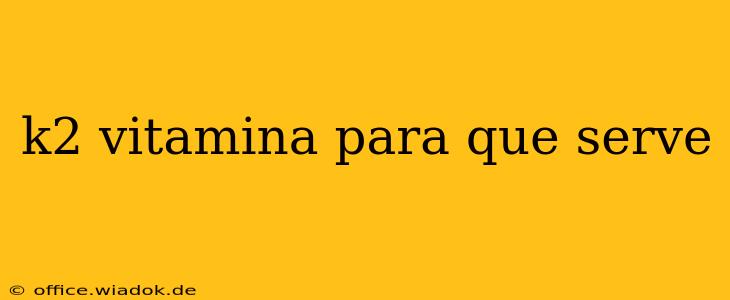Vitamin K2, a lesser-known member of the vitamin K family, plays a crucial role in maintaining good health, often overshadowed by its more famous cousin, vitamin K1. Understanding its function and benefits is key to appreciating its importance in a balanced diet and overall well-being. This comprehensive guide delves into the uses of vitamin K2, its various forms, and how it contributes to your health.
What is Vitamin K2?
Vitamin K2, also known as menaquinone (MK), is a group of fat-soluble vitamins crucial for bone health, cardiovascular health, and potentially other bodily functions. Unlike vitamin K1 (phylloquinone), primarily found in green leafy vegetables, K2 is produced by bacteria in the gut and found in fermented foods. Its various forms, differentiated by the number of isoprene units in their chemical structure (e.g., MK-4, MK-7), influence its bioavailability and biological activity.
Key Benefits of Vitamin K2:
1. Bone Health:
Perhaps the most well-known benefit of vitamin K2 is its role in bone health. It activates proteins, like osteocalcin, essential for calcium deposition in bones, making them stronger and reducing the risk of osteoporosis and fractures. This action is distinct from vitamin D, which aids in calcium absorption. Vitamin K2 ensures that the absorbed calcium is utilized effectively for bone building rather than depositing in arteries.
2. Cardiovascular Health:
Emerging research suggests a strong link between vitamin K2 intake and cardiovascular health. It activates Matrix Gla Protein (MGP), a protein that inhibits the calcification of arteries, a major contributor to heart disease. By preventing arterial calcification, vitamin K2 may reduce the risk of heart attacks, strokes, and other cardiovascular complications.
3. Dental Health:
While less researched than its bone and cardiovascular benefits, some studies suggest a potential role for vitamin K2 in maintaining healthy teeth and gums. Its influence on bone health indirectly contributes to jawbone strength, supporting dental health. Further research is needed to fully understand this aspect.
Different Forms of Vitamin K2:
Several forms of vitamin K2 exist, each with varying bioavailability and half-life:
- MK-4 (Menaquinone-4): Found naturally in animal products like meat, eggs, and cheese, it is quickly metabolized.
- MK-7 (Menaquinone-7): Found in fermented foods like natto (fermented soybeans), it has a longer half-life, meaning its benefits are sustained longer. It’s often considered the most effective form for supplementing vitamin K2.
Dietary Sources of Vitamin K2:
While supplementation is an option, incorporating vitamin K2-rich foods into your diet is beneficial. Good sources include:
- Natto: A fermented soybean dish, a particularly rich source of MK-7.
- Aged cheeses: Cheddar, Gouda, and Swiss cheese contain varying amounts of MK-4.
- Fermented vegetables: Sauerkraut and kimchi may offer some amount of vitamin K2.
- Organ meats: Liver and kidneys are sources of MK-4.
Vitamin K2 Deficiency:
While rare, vitamin K2 deficiency can potentially lead to weakened bones, increased risk of heart disease, and other health problems. Individuals at higher risk include those with malabsorption issues, taking certain medications, or following very restrictive diets.
Conclusion:
Vitamin K2 plays a vital role in maintaining overall health, particularly bone and cardiovascular well-being. Incorporating K2-rich foods into your diet or considering supplementation, especially MK-7, can be beneficial for optimizing your health. Always consult a healthcare professional before starting any new supplements, especially if you have underlying health conditions or are taking other medications. They can advise you on the appropriate dosage and whether vitamin K2 supplementation is right for you.

